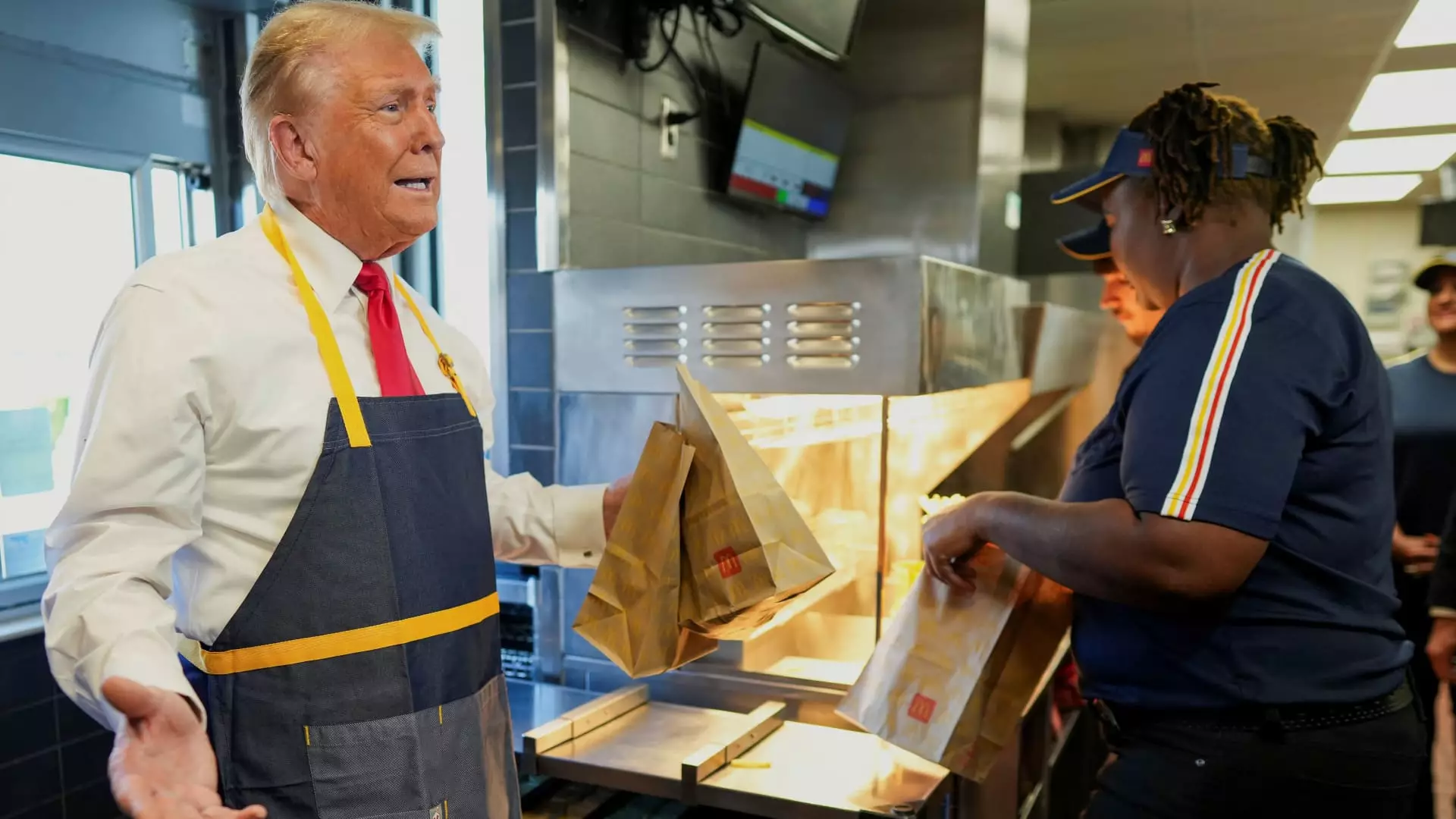The recent foray of former President Donald Trump into a Pennsylvania McDonald’s has reignited discussions about the complex relationship between fast-food brands and the political landscape. McDonald’s, a global icon of American culture and cuisine, faces a unique challenge: how to maintain its apolitical stance while being unintentionally thrust into the spotlight of political debates. As Trump took to the fry cook’s station, ostensibly to demonstrate his familiarity with common American jobs, he simultaneously broadened the discourse surrounding McDonald’s, forcing the brand to clarify its position amid heightened scrutiny.
In an internal memo noted by CNBC, McDonald’s emphasized its neutrality in political matters. The company acknowledged that its brand has become synonymous with the current election cycle, driven by an enthusiastic endorsement from Trump himself. This situation illuminates the balancing act corporations must perform in today’s increasingly polarized environment. McDonald’s reiterated that it does not endorse political candidates, reinforcing its commitment to serving “everyone” regardless of partisanship.
Trump’s antics at the McDonald’s location were not just about engaging with the community; they were also a strategic move aimed at his opponent, Vice President Kamala Harris. By casting doubt on Harris’s claims of working at McDonald’s during her youth, Trump sought to undermine her integrity while simultaneously showcasing the fast-food chain’s cultural relevance. However, it is essential to note that such political theatrics can have both beneficial and detrimental effects on a brand like McDonald’s.
While Trump’s visit generated significant media coverage, it risks overshadowing McDonald’s core identity as an establishment serving customers from all walks of life. The challenge is that in attempting to maintain its brand image, McDonald’s could inadvertently become a political toy, pulled into disputes that deter potential customers who prefer their burgers without the side of political drama.
The backlash against companies taking political stances has gained momentum in recent years, as indicated by falling percentages of Americans believing businesses should take public positions on social issues. McDonald’s had previously supported movements like Black Lives Matter, yet the company now appears to be reevaluating such endorsements in light of evolving consumer sentiments. This shift reflects a broader trend among corporations, including others like Ford and Harley-Davidson, pulling back from overtly ideological policies, perhaps in an effort to retain broader market appeal.
By distancing itself from political allegiance, McDonald’s aims to fortify its customer base. The brand’s effort to highlight its status as a welcoming space for all individuals, reinforced by franchisee Derek Giacomantonio’s statement, underscores the necessity for inclusivity. This is especially pertinent in a divided political climate where businesses face the potential to alienate either side of the aisle.
As the political discourse surrounding McDonald’s heightened, so did criticism regarding its pricing strategies. Social media posts highlighting exorbitant costs for basic menu items, like an $18 Big Mac meal, linked McDonald’s price hikes to broader economic concerns, including inflation. Republican narratives exploited this concern to frame the rising costs as a direct consequence of the current administration’s economic policies, again entangling the brand in political rhetoric.
This situation exemplifies the delicate role McDonald’s plays not only as a provider of fast food but also as a reflection of the American economy. In response to the mounting criticism, McDonald’s leadership sought to address these concerns through open letters and factual clarifications regarding pricing. It underscores an emerging need for corporations to actively engage with consumer perceptions, especially when they intersect with political narratives.
As the 2024 presidential race unfolds, McDonald’s finds itself at a unique intersection of politics, consumer sentiment, and economic realities. The company’s attempt to remain neutral while being besieged by political overtones calls for strategic navigation of its brand identity. Through clear communication and a commitment to inclusivity, McDonald’s can potentially shield itself from the divisive nature of contemporary politics, ensuring that it continues to resonate with a broad demographic of Americans who simply want to enjoy a meal. Ultimately, the most sustainable approach for McDonald’s may lie in focusing on its core mission: delivering quality food to the American public while tactfully sidestepping the partisan fracturing that characterizes today’s political discourse.


Leave a Reply